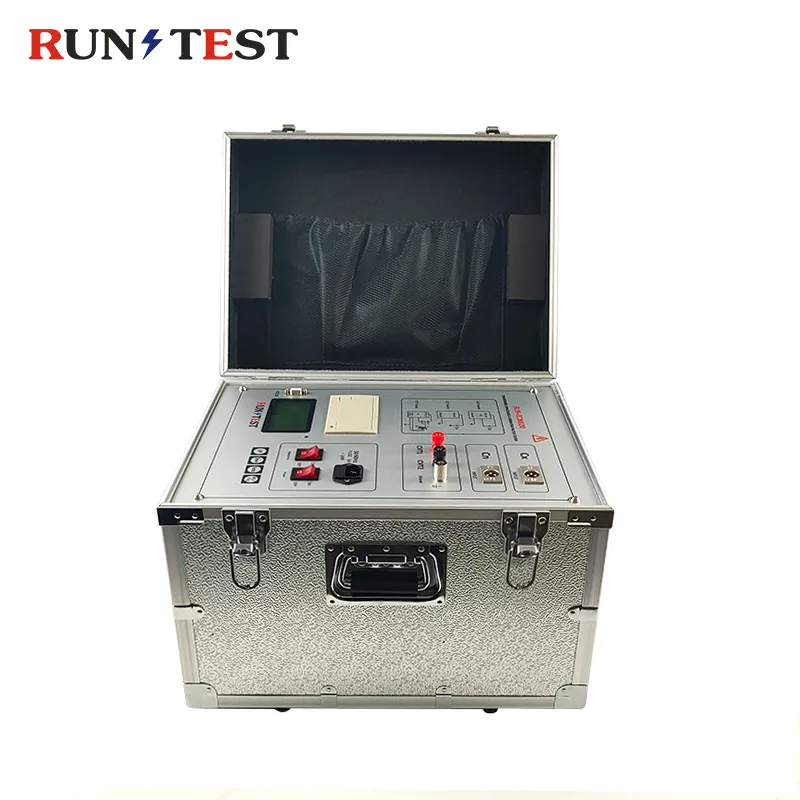Wozu dient ein Widerstandsprüfer? Verständnis von Isolations- und Widerstandsprüfgeräten
Mai 2, 2025

Bei der elektrischen Wartung sind Sicherheit und Genauigkeit nicht verhandelbar. Egal, ob Sie ein professioneller Elektriker, ein Ingenieur oder ein Gebäudemanager sind, mit den richtigen Prüfwerkzeugen stellen Sie sicher, dass elektrische Systeme ordnungsgemäß funktionieren und vor potenziellen Gefahren geschützt sind. Zu diesen unverzichtbaren Werkzeugen gehört das Widerstandsmessgerät - ein Gerät, mit dem gemessen wird, wie viel Widerstand ein Material oder ein Bauteil dem Fluss von elektrischem Strom entgegensetzt. Aber wofür genau wird ein Widerstandsprüfer verwendet?
Von der Messung der Isolationsqualität bis zur Überprüfung der Systemsicherheit - Widerstandsprüfer, auch als Isolationswiderstandsprüfer - sind sowohl im privaten als auch im industriellen Bereich unverzichtbar.
Was ist ein Widerstandsmessgerät?
Ein Widerstandsprüfer ist ein elektronisches Instrument zur Messung des Widerstands elektrischer Komponenten oder Systeme. Dazu gehört die Bewertung des Zustands von Kabeln, Isolierungen, Motorwicklungen, Schaltanlagen und mehr. Diese Prüfgeräte helfen bei der Erkennung von Fehlern wie Isolationsverschleiß, Kurzschlüssen oder eingedrungener Feuchtigkeit - Probleme, die zu Geräteausfällen oder sogar elektrischen Bränden führen können.
Es gibt verschiedene Arten von Widerstandsprüfgeräten, darunter:
- Allgemeine Widerstandsmessgeräte für die Prüfung von Standardkomponenten
- Isolationsprüfgeräte ausgelegt für hochohmige Messungen (typischerweise in Megaohm)
- Mikroohmmeter für niederohmige Messungen in Schaltkreisen
Sie sind jeweils auf bestimmte Anwendungsfälle und Spannungsbereiche zugeschnitten und eignen sich daher für alle Bereiche, von der Hausinstallation bis hin zur Wartung im industriellen Maßstab.
Wichtigste Anwendungen eines Widerstandsmessgeräts
- Prüfung elektrischer Isolierungen
Einer der wichtigsten Verwendungszwecke eines Isolationswiderstandsprüfer ist es, die Unversehrtheit der Isolierung von Kabeln, Transformatoren und Elektromotoren zu überprüfen. Eine Isolierung, die Feuchtigkeit aufgenommen hat oder im Laufe der Zeit abgebaut wurde, kann zu Kurzschlüssen oder Leckströmen führen. - Routinemäßige Wartung von elektrischen Geräten
Die Widerstandsprüfung ist eine präventive Wartungsmethode, die in Fabriken, Kraftwerken und Rechenzentren eingesetzt wird. Die Ausrüstung wird routinemäßig getestet mit Isolationsprüfgeräte um sicherzustellen, dass die Geräte innerhalb sicherer Grenzen arbeiten. Dies hilft, ungeplante Ausfallzeiten zu vermeiden und die Lebensdauer der Geräte zu verlängern. - Inbetriebnahme neuer Anlagen
Vor dem Einschalten einer neu installierten elektrischen Anlage stellt die Widerstandsprüfung sicher, dass die Anlage korrekt verdrahtet ist und alle Komponenten sicher sind. A Widerstandsmessgerät können Herstellungsfehler, Installationsfehler oder eine beschädigte Isolierung aufdecken. - Fehlersuche bei Störungen
Wenn in einem System unerwartete Ausfälle oder Unterbrechungen auftreten, hilft die Widerstandsprüfung, Fehler schnell zu lokalisieren und zu isolieren. So kann beispielsweise ein plötzlicher Abfall des Isolationswiderstands auf ein Eindringen von Wasser, physische Schäden oder alternde Kabel hinweisen. - Einhaltung von Vorschriften und Sicherheitsprüfungen
In vielen Branchen sind regelmäßige Isolationsprüfungen erforderlich, um die Sicherheitsvorschriften zu erfüllen. Eine professionelle Isolationsprüfgerät können Elektriker bei der Einhaltung von Normen wie IEC, IEEE oder OSHA unterstützen, indem sie die Prüfergebnisse dokumentieren und verifizieren.
Wie funktioniert ein Isolationstester?
Ein Isolationsprüfgerät legt eine hohe Gleichspannung (in der Regel 250 V, 500 V oder 1000 V) an das zu prüfende Bauteil an und misst den Widerstand über der Isolierung. Die Ergebnisse, die in Megaohm (MΩ) angezeigt werden, geben Aufschluss über die Wirksamkeit der Isolierung:
- Hoher Widerstand (100 MΩ oder mehr) = Gute Isolierung
- Mäßiger Widerstand (1-100 MΩ) = Überwachen oder erneut testen
- Niedriger Widerstand (<1 MΩ) = Defekte Isolierung; muss ersetzt werden
Moderne Prüfgeräte verfügen über Funktionen wie Datenspeicherung, automatische Bereichserkennung und digitale Anzeigen, die die Prüfung schneller und genauer machen.
Die Wahl des richtigen Widerstandsprüfgeräts
Wenn Sie einen Isolations- oder Widerstandsprüfer kaufen, ist es wichtig, dass das Gerät auf Ihre Anwendung abgestimmt ist. Hier sind einige wichtige Faktoren, die Sie berücksichtigen sollten:
- Spannungsbereich: Passen Sie es an das zu prüfende System an.
- Messbereich: Höherwertige Prüfgeräte bieten bis zu 1000 GΩ.
- Dauerhaftigkeit: Die robusten, wasserfesten Prüfgeräte sind ideal für den Einsatz vor Ort.
- Zertifizierungen: Achten Sie auf Modelle, die den Sicherheitsnormen entsprechen.
Eine Auswahl an Modellen für den professionellen Einsatz finden Sie unter Spannungsprüfer, einschließlich ihrer engagierten Isolationswiderstandsprüfer und Widerstandsmessgerät Kategorien.
Abschließende Überlegungen
Wozu dient also ein Widerstandsprüfer? Ganz einfach: Es ist Ihr Diagnose- und Sicherheitswerkzeug zur Bewertung des elektrischen Widerstands und der Isolationsintegrität. Ganz gleich, ob Sie eine Fehlersuche an einem Motor durchführen, einen Stromkreis überprüfen oder sich auf ein Compliance-Audit vorbereiten, ein Qualitätsprüfgerät Isolationsprüfgerät oder Widerstandsmessgerät sorgt für genaue Ergebnisse und mehr Sicherheit.
Da die Anforderungen an die elektrische Sicherheit steigen, ist die Investition in die richtigen Prüfgeräte wichtiger denn je. Entscheiden Sie sich für vertrauenswürdige Geräte von erfahrenen Herstellern wie Voltage Tester - Ihre zuverlässige Quelle für leistungsstarke Widerstandsprüflösungen.
